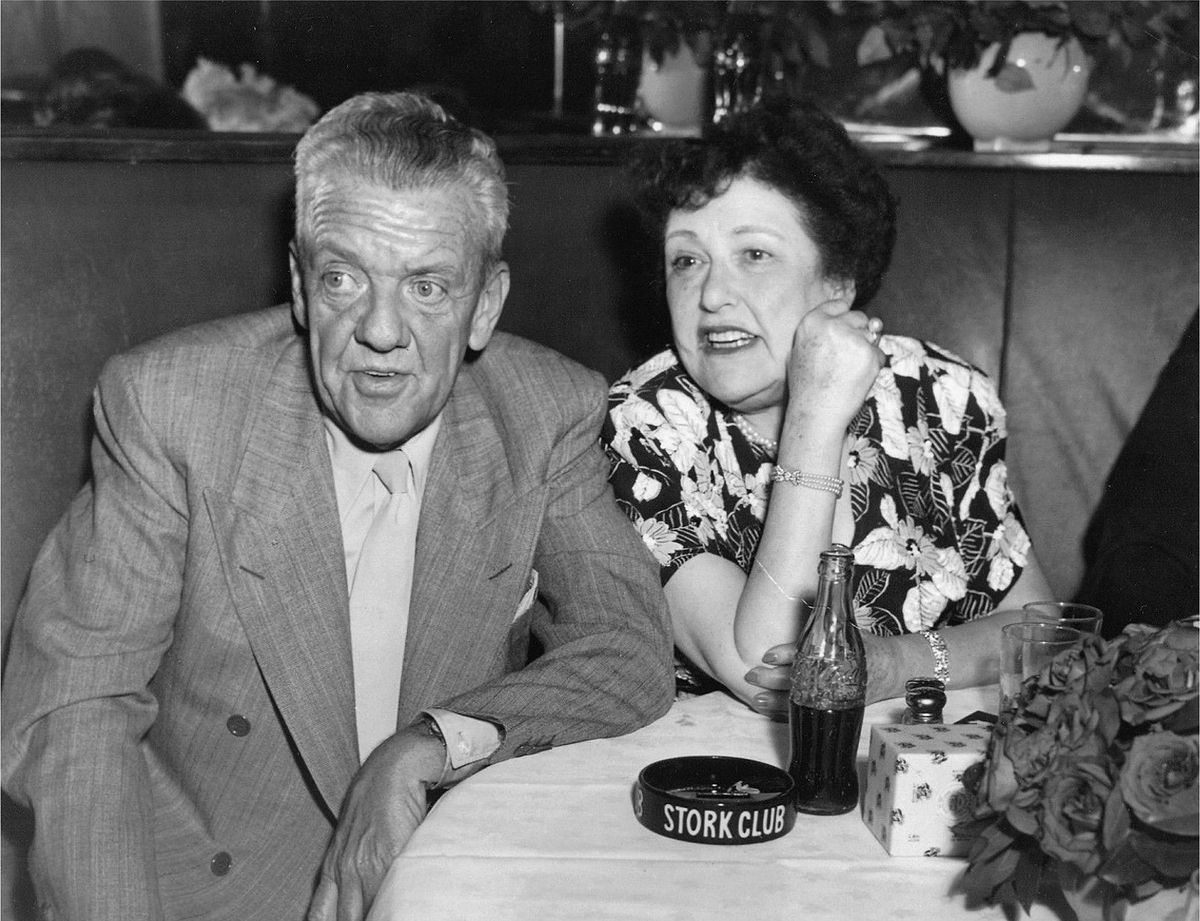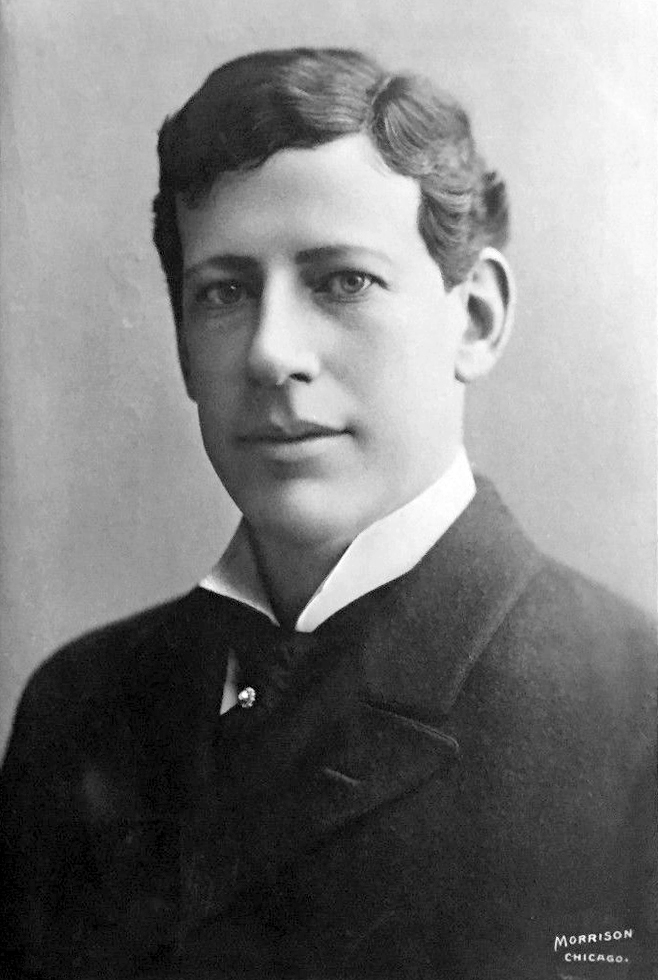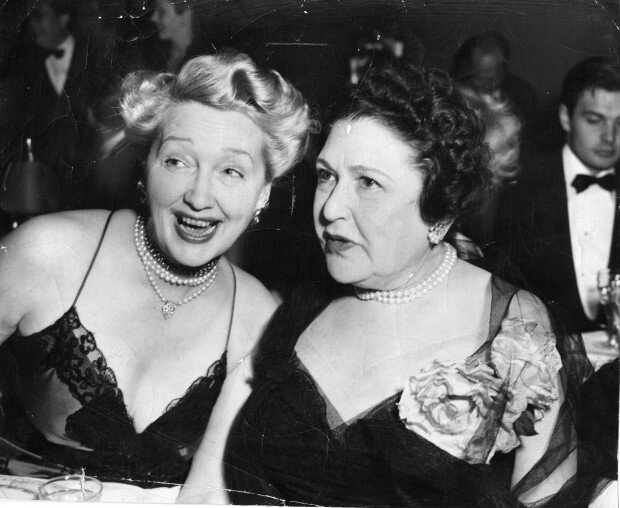

HEDDA & LOUELLA
Movie-struck columnist Louella Parsons used extortion and blackmail to rule Hollywood’s gossip mill with an iron glove for decades. It would be accurate to say that it was more the stories she did not print that gave her a vice-like grip on the studios and their stars. The articles that did make it into her column were often riddled with inaccuracies, innuendo, tastelessness, poor syntax and spelling errors. When Mae West first hit town Louella caustically described her as ‘fat, fair, and I don’t know how near forty’, yet later Mae would in turn describe Parsons as a dear friend. It was the only way an actor or actress could treat the woman if he or she hoped to keep their careers healthy. Stars and studio heads lavished gifts on Louella simply to curry favour, particularly at Christmas, Thanksgiving or on her birthday.

Louella & ‘Docky’ at the Stork Club
She was born in Freeport, Illinois in 1881. Ignoring the documented fact that her father had died in 1890, she quickly falsified her date of birth to read 1893! Her third husband was a hopeless alcoholic named Harry Martin, known to all and sundry as ‘Docky’. When Louella met him he was the house doctor at the film capital’s choicest bordello. In that capacity he became privy to intimate personal secrets of Hollywood’s stars and their spouses. He knew who had abortions, who had sexual diseases, who was pregnant and to whom. Louella’s army of paid informants was equally adept at passing on information to her. Florists, lab technicians, switchboard operators, beauty parlour staff, doormen, janitors and chauffeurs, to name but a few of her varied sources, kept her files filled with morsels of bile she could draw on when needed.

Hedda Hopper in her favourite hat
Life at the top of the blackmailing gossip heap for Louella changed, however, in the early 1940s, with the arrival of competition in the shape of a failed actress named Hedda Hopper. Nudging fifty, she had been given a start by her old chum, actress Marion Davies, back in 1935, writing a weekly fashion column in The Washington Post. By 1939, ‘Hedda Hopper’s Hollywood’ was being syndicated in several major newspapers across America. For the first time Louella had a serious competitor. And one equally ruthless and obnoxious as herself. Actor Ray Milland charitably described Hedda as ‘an unmitigated bitch…venomous, vicious, a pathological liar and quite stupid.’ And he was probably holding back. Hedda and Louella were two sides of the same coin. They would battle each other for the next twenty years and the stars would be caught in the crossfire. If one columnist was fed a morsel of news from a star, the other columnist would launch a vendetta against him (or her).

DeWolf Hopper
Entering this world via Hollidaysburg, Pennsylvania as Elda Furry, in 1885, Hedda was raised in a strict Quaker home. She was twenty-eight when she met and married matinee idol DeWolf Hopper Sr. in 1913. Two years later the couple moved to Hollywood where DeWolf became a star for the Triangle Company and Elda (now Hedda) played vamps for a while before being relegated to character roles. They had one son, William, who would go on to achieve his own modicum of success portraying private investigator Paul Drake in the popular Perry Mason series on TV in the late fifties. Like Louella, Hedda shaved years off her real age and pretended she had been born in 1890.
Neither woman had much of a grasp on journalism. Nor on history it seems. Louella once filed a story, claiming that Sigmund Freud was about to be hired by Warner Brothers as a technical adviser on the Bette Davis drama Now Voyager (1942). She was simply unaware the man had been dead for a couple of years. Hedda, on the other hand, never forgot the slights she had received during her unsuccessful acting years, especially the snubbing she endured at the hands of big star Joan Bennett at the time. When Joan’s husband, producer Walter Wanger, shot his wife’s lover, agent Jennings Lang, in the testicles, Hedda had a field day in her column. Joan responded by sending her a unique Valentine – a skunk! It was accompanied by a card that read:
‘Here’s a little Valentine
That very plainly tells
The reason it reminded me so much of you –
It smells!
Joseph Cotten booted Hedda’s backside at a party after she wrote of his alleged extra-marital affair with Deanna Durbin. And on another occasion Anne Sheridan dumped a plate of mashed potato in the columnist’s lap. Then, of course, there were those who reacted by licking Hedda’s boots. Cowboy stars Gary Cooper, John Wayne, William Boyd, Harry Carey and Roy Rogers sent her a telegram that read: ‘Hedda you old hop-toad. First you went to Texas, now you’re in Arizona. That’s cow country and that means cowboys. And cowboys means lots of fun for all America. So have a good time. But for gosh sakes don’t forget to come back to us. Regards and success from the Arizona gang.’ Were they fawning or taking the Mickey? Given the woman’s extreme right-wing politics (her allies/sources included Senator Joseph McCarthy, J Edgar Hoover, Ronald Reagan and Howard Hughes), she had a lot in common with the bunch that concocted the telegram.

A rare shot of the two harridans together
When Merle Oberon asked Hedda what made her write a column about her that was so full of bile, the columnist replied triumphantly: ‘Nothing, dear. It’s bitchery. Sheer bitchery.’ Often Hopper would proudly point at her luxurious house on Tropical Drive in Beverly Hills and declare: ‘That’s the home fear built!’ When she attempted to dissuade Liz Taylor from marrying Michael Wilding; by stating that he had once had a homosexual affair with none other than Stewart Granger, the incensed Granger promptly hit her with a $3 million lawsuit for libel that resulted in a substantial out-of-court settlement and a full apology from Hedda.
Old age and the demise of the once powerful studio system ultimately sent these two harridans the way of the dodo. Their public also tired of them. Hedda finally succumbed to double pneumonia at eighty, in 1966, and Louella shuffled off this mortal coil around six years later, a victim of arteriosclerosis. She was ninety-one. ‘Docky’ had preceded her in death by over twenty years. Few missed any of them.

What kind of person wants to make a living from exposing and benefiting from the pain of others? Dreadful.
Quite a few people, it would seem, Cat.
The only satisfaction we can take over these two harridans is that both lived long enough to see themselves become irrelevant and powerless in their careers.
Walter Winchell was similar to Hopper and Parsons with his newspaper column. He spit out hatred and vile, maligned people, and loved the power he held.
He would outlive his fame and see himself become a useless relic of the past. Karma at its best.
I’m glad you mentioned Winchell, Mike. Did you know that the J J Hunsecker role played by Burt Lancaster in ‘Sweet Smell of Success’ was modeled on him. The man was quite a piece of work and hated by virtually all who knew him.
I did read that regarding the Hunsecker character, Alan. I’ve read that the deceased radio commentator in The Great Man movie, and Lonesome Roads in A Face in the Crowd were both based upon Arthur Godfrey. AG was another piece of work that had audiences fooled by his warm, easy going, folksy persona, but was a tyrant & nasty man behind the scenes.
I did not know about Arthur Godfrey, Mike, but it does not surprise me. George Jessel was another nasty bastard who preyed on young actresses whenever the opportunity arose. Hollywood has always had a plethora of predators, both male and female.
At my advanced age, I complain constantly about the toxicity of “social” media.
Thank you for reminding us (or revealing to us), that there was a less “viral” yet equally vicious version of public disinformation in the 30s and 40s.
When we were young and at summer camp or a birthday party “Telephone” was often a highlight, sitting in a circle with people whispering a simple harmless sentence into the next person’s ear. By the time it got back to the beginning it almost always morphed into something totally different, sometimes hilarious, sometimes downright creepy.
Whatever else changes, human nature never does.
William Hopper was, in addition to Paul Drake, whom he played wonderfully, Major (or some rank like that) Penmark in “The Bad Seed” and the father of Natalie Wood in “Rebel Without a Cause.” He assayed those splendidly iconic clueless parental figures to perfection. They were both utter dopes, from first frame to last. The laugh was they were each supposed to represent male parental authority at its most unassailable.
Both those grand representations of U.S. family life were shot in 1955.
Thanks for your good work, Alan.
Thankyou, Dan. I keep wondering if and when I shall run out of material, but the pit appears to be bottomless at present.